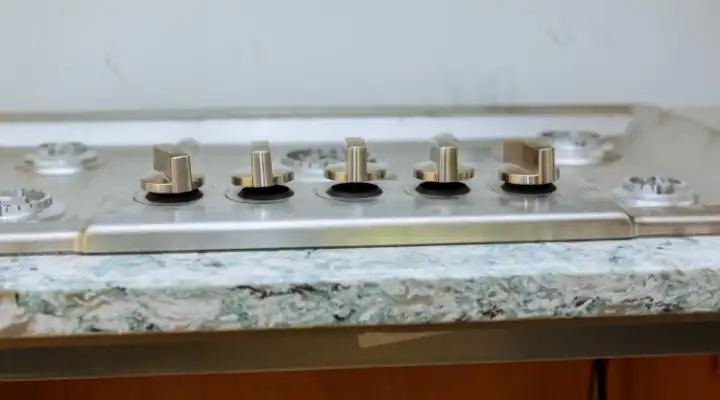A gas leak in the kitchen is one of the most serious household risks, and although it doesn’t occur frequently, it’s essential to know how to detect it early. A small leak, if not identified quickly, can become a potential danger to both your family and your property.
In Panama, where many homes use liquefied gas in cylinders or piped for cooking, being prepared can make all the difference. In this article, we explain how to identify the signs of a gas leak, what to do if you suspect one, and how to prevent these types of situations with simple measures.
Why is it so important to detect a gas leak in time?
Liquefied petroleum gas (LPG), the most common gas in Panamanian kitchens, is highly flammable. Although it has no natural odor, a chemical compound with a strong smell (similar to rotten eggs) is added to make leaks easy to detect. Even so, many people ignore the signs or don’t know what to do.
A leak can cause:
- Explosions or fires if there is a spark or flame nearby.
- Poisoning from prolonged inhalation, especially in enclosed spaces.
- Damage to appliances or installations.
- Emergency situations requiring evacuation.
Therefore, knowing how to detect a gas leak at home not only protects your kitchen, but also your life and that of your family.
Most common signs of a gas leak in the kitchen
Fortunately, household gas usually gives clear signs of a leak. Some of the most common symptoms are:
- A strong, unusual odor resembling rotten eggs or sulfur.
- A humming or hissing noise near the stove, hoses, or cylinder valve.
- The presence of gas without the stove being turned on.
- Wilting plants near the cooking area if the gas is leaking slowly.
- Physical symptoms such as headache, dizziness, or nausea when spending a lot of time in the kitchen.
If you detect one or more of these signs, it’s time to act with caution.
How to safely detect a gas leak?
If you suspect a leak, do not turn on any switches or use fire. The slightest spark could cause an explosion. These are the steps you can take to confirm the presence of a leak without putting your safety at risk:
- Turn off the gas valve
Close the cylinder valve or the main gas tap immediately to prevent further release.
- Ventilate the room
Open doors and windows to allow the gas to disperse quickly. Do not use electric fans.
- Use the soapy water test
This is one of the most effective and safest methods for detecting small leaks:
- Mix water with a little liquid soap (dish soap works well).
- Apply the mixture with a sponge or brush to the connections: hose, valve, regulator, and unions.
- If there is a leak, you will see bubbles form in the affected area.
This method is ideal for checking gas cylinders, stoves, or new installations that you want to verify.
- Look at the regulator and hose
Many leaks are due to damaged or improperly connected hoses. If you see cracks, cuts, or signs of wear, it’s safest to replace them immediately.
What to do if you confirm a leak?
If you have already confirmed a gas leak, act quickly and with caution:
- Turn off the gas completely at the main source (cylinder or shut-off valve).
- Evacuate the area, especially if the odor is very strong or if the leak does not stop.
- Do not use any electrical appliances, lighters, or matches.
- Call a qualified gas technician to check and correct the installation before using it again.
In serious cases, if you feel there is an imminent risk, contact the fire department or your local emergency services. Prevention is better than cure.
Measures to Prevent Gas Leaks in the Kitchen
In addition to knowing what to do in the event of a leak, it is important to take preventive measures to minimize risks in your home:
- Check the gas hose regularly. Change it every 2 or 3 years or if you see signs of wear.
- Check that the regulator is in good condition and tight.
- Make sure the connections are secure, without unnecessary movement or twisting.
- Do not store the gas cylinder near heat sources or in direct sunlight.
- Install gas detectors, especially if you live in apartments or with closed kitchens.
- Perform preventive maintenance with a certified technician at least once a year.
These simple actions will give you greater peace of mind and extend the life of your equipment.
When should you call a technician?
Although you can do some checks yourself, it’s recommended that a specialized domestic gas technician check your system in the following cases:
- If you’ve just installed a new stove or replaced the cylinder.
- If you notice a persistent smell of gas, even after checking the connections.
- If you want to change the type of installation (from a cylinder to a fixed line, for example).
- If you need a general system check for greater safety.
A professional can perform pressure tests, check for internal leaks, and ensure that all components are in good condition.
Keep in mind that…
A gas leak in the kitchen is a risk that shouldn’t be taken lightly. However, with the right knowledge and some precautionary measures, it’s possible to detect and prevent them in time. Learning to identify the signs, acting quickly, and maintaining your system in good condition can prevent serious accidents.
If you have questions about the condition of your system or prefer a professional inspection, don’t hesitate to contact a technician specializing in gas installations in Panama. Your safety and that of your family should always come first.

